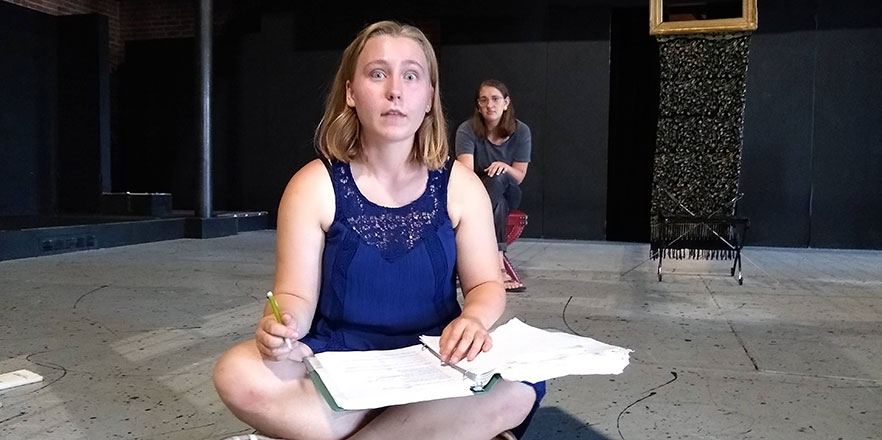Gender, Power, Shakespeare and Queen Elizabeth Come Together for 'Cultivating the Queen'
By Whitney Rich '20

On Saturday, Sept. 7, the Walla Walla community gets a chance to see the theatrical results of a Whitman College faculty-student summer research project.
"Cultivating the Queen," was produced by Paul Garrett Fellow and Professor Christopher Petit and Whitman students Ashlyn Quintus '20, Rose Heising '20 and Ruby Daniel '20 as part of the Louis B. Perry Summer Research Endowment and the Parents Fund for Student-Faculty Research. The production explores gender and power within the framework of the reign of Queen Elizabeth I and the language of Shakespeare.
"We did a lot of research into Queen Elizabeth, and then we started looking through Shakespeare's plays and trying to find connections and places where these things overlap," Petit said. "There is lots of research about where Queen Elizabeth is mentioned specifically in Shakespeare's plays, like in ‘A Midsummer Night's Dream.'"
For the project, Petit gave prompts to the student researchers like, "we need a prison scene, a scene about love and a scene about revenge," and the students would comb the texts of Shakespeare to find language that they could apply to the production. "It was a fun task and everything that people would bring, or that I would bring, would change it in a different direction - and we'd follow that path and see where it took us," Petit said.
Daniel, a theatre major, echoed the collaborative sentiment of the project.
"I learned a ton about working really closely with a small group of peers and collaborators. We went anywhere and everywhere in our conversations to bring together the play, and it helped me realize that work can truly be created about anything and in any way you want it to," she said.
Petit found that the individual voices of the researchers, their interests, and the investment of the students became common themes in the final product.
"When you work with people, who those people are ends up emerging, because their points of view are invested in the project. The nature of my work is that it is very collaborative. I try not to impose anything, but rather allow it to emerge and then follow paths," Petit said.
For Heising, the research and construction of the production was an opportunity for her to dive into rich contemporary relevance of Shakespeare, as well as open her eyes to the vast array of modern interpretations made possible by his texts. In her research, Heising found that by following and understanding the burdens on female characters in Shakespeare's plays she found parallels in the structures of sexism and power today.
"We've included a scene of ‘Measure for Measure,' which portrays sexual harassment in an eerily contemporary way. In Shakespeare's plays, if women have power, it comes from shrewishness, witchiness, motherhood or beauty. Examining how Queen Elizabeth maintained power for so long in that patriarchy is relevant for all women today who struggle with societal expectations, slut or prude-shaming, and the body politic," said Heising, who is majoring in theatre.
Quintus, an English and theatre double major, was not only excited about the opportunity to be compensated for theatrical work and research as part of the grant, but to see the creative process from beginning to end.
"Eventually, with each collaborative conversation, or scene we staged together, or plot point we imagined, the individual research became more measurable, urgent, and exhilarating; it began to feel like the research we'd bring back would be equivalent to finding the lost corner of a vast jigsaw puzzle".
Once the students had sufficient background research, the staging and writing process began. The play was written in a devised theatre format. Much of the play came about organically in rehearsals with improvisations by the student-actors.
"We staged and wrote the play at the same time, so the text was constructed from Shakespeare texts, but also additional text was created through improvisations, investigations, and the staging of the play so these things happened at the same time," Petit said.
The final production is being performed at the Gesa Power House Theatre at 7 p.m. Saturday, Sept. 7, 2019.